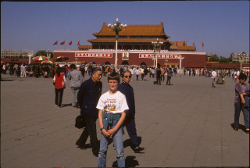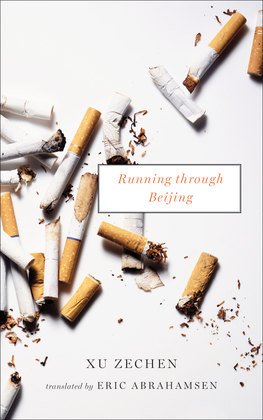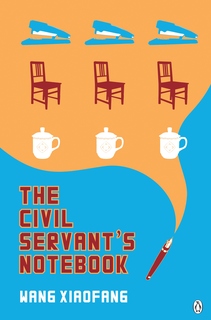Posts
By Eric Abrahamsen, February 23, '08
Lu Jinbo (路金波) is one of the major publishers associated with internet literature and the new generation of youth writing. He began his career as a writer, under the pen-name Li Xunhuan (李寻欢), and along with Annie Baby (安妮宝贝) and Ning Caishen (宁财神) was one of the "three chariots" (三辆马车) of Rongshuxia.
By 2002 he began thinking of leaving writing behind, and moved to the Rongshu Culture Company, which became a part of Bertelsmann in that year. Since then he has become something of a minor celebrity in the publishing world, publishing the flashiest writes, giving the biggest advances, and generally breaking all the rules. The biggest names on his list are Wang Shuo, Han Han, Guo Jingming and Annie Baby, though he has a hand in plenty of other profitable publishing ventures. For further background, see Danwei's translation of an interview with him.
More…
By Eric Abrahamsen, February 15, '08
An unfortunate bit of news: we've been asked by the State University of New York press to take down our samples of Wang Xiaobo's Golden Age, since the samples apparently conflict with the English-language translation rights they hold for Wang in Love and Bondage. Frankly, I'm not in the least convinced that this is legally viable, but I'm also very unwilling to get into a fight about it. The prospect of a practically penniless university press suing a group of actually penniless translators over stories few are ever likely to read is too depressing to bear consideration, so down they come. We're leaving the stubs up; if you want to read the longer samples email us.
By Eric Abrahamsen, February 8, '08
Xu Xing originally gained fame as a writer during the 1980s, when he was a prominent member of the literary revival that followed the end of the Cultural Revolution. He emigrated for Germany in 1989, and didn't return for four years. He currently lives in Beijing and is working on a book about his experiences during the Cultural Revolution. He will spend most of 2008 as a writer-in-residence at the UCLA.
In the beginning...
"I'd heard of computers before I left China, but I'd never actually seen one. In Germany they had those 286s, running DOS – I got to be pretty good at DOS in Germany.
"When I went back to China 1993 I brought a computer with me; it had a black and white monitor; I thought it was such a prize… But I discovered that in the few years I'd been gone, computers had already become commonplace in China."
More…
By Eric Abrahamsen, February 6, '08
PEN international has put out a call for submissions, related to a certain campaign they've got going. Cowardice prevents us from saying more; have a look for yourself. 500-1,000 words, I only just noticed that it should be in Chinese.
By Eric Abrahamsen, January 29, '08
Wang Lei (王蕾) has been working in the editorial department of the Shanghai Century Publishing House since January of 2003. Shanghai Century has involved itself in internet-related books since 2003, and Wang’s responsibilities include planning and editing internet-related publishing projects.
Projects
Shanghai Century Publishing first became associated with internet publishing in 2003, when it put out 毕业那天我们一起失恋 (roughly, Our Hearts Were Broken the Day We Graduated), a book which was originally posted in installments on the internet. “That was the first year that the internet really became a publishing phenomenon,” recalls Wang Lei. “We had been watching the internet for quite a while before that, but that was the first book that was published and marketed as ‘internet literature’. It did quite well, selling 300,000 copies, much better than we had expected.”
In 2005 Shanghai Century expanded into books derived from blogs run by well-known personalities. The flagship publication was Wang Xiaofeng’s 不许联想 (bùxǔliánxiǎng), taken from his blog of the same name. Wang, a music critic for Sanlian Life Weekly magazine, has become a minor celebrity for his daring, acerbic social commentary. “We helped him pick certain articles and group them accordingly, but other than that we didn’t alter or edit his writing,” says Wang Lei. She believes that readers will treat the experience of reading the book differently than the experience of reading the blog online, and says the publishing house is “satisfied” with sales of this and other blog-derived books.
More…
By Eric Abrahamsen, January 29, '08
Wang Zhen is the Deputy General Manager of Penguin’s China office. She reads avidly online, both for her work and out of person interest.
“I started going online about 10 years ago, mostly to a site call Jinjiang Wang (晋江网) – actually I still do most of my reading there. Jinjiang is very famous among female readers, as it carries mostly romantic fiction. It used to just copy content from Taiwanese sites, but about four years ago it started having original content, as well.
“About three years ago I started looking at Qidian (起点), but again I mostly read the romance stories, and also the tomb-raiding (盗墓) stuff – sort of Indiana Jones style adventure. Also ghost stories. Everything I read is very short, very quick, very entertaining. It’s also nice because you can’t find a lot of that content in books at all. Stuff like ghost stories or tomb-raiding is considered unhealthy (不良, bùliáng) content, harmful to society, so it’s only available online. There’s even gay literature online*.
More…
By Eric Abrahamsen, January 26, '08
Formal announcement of the Sino-British Literary Translation Course has been made by Penguin and Arts Council England, the two sponsoring bodies of the course. This from the press release:
This exciting programme will offer a free residential workshop to early- and mid-career literary translators, working in both English and Chinese.
The aim is to create a platform for exchange among writers and translators from China and the UK to foster publishing and editorial excellence in both countries. In addition, it is hoped that the establishment of this translation programme will see greater numbers of Chinese works successfully make the long journey into the English language.
A one-week pilot programme will begin March 16, 2008, and has been made possible by the generous support of China’s General Administration of Press and Publications, England’s Department of Culture, Media and Sport, and Arts Council England. Course development is to be provided by the pioneering British Centre for Literary Translation.
Workshop sessions will be led by renowned sinologists and translators Howard Goldblatt and Bonnie McDougall, who will work with students and respected contemporary Chinese authors on a short story or chapter from a longer work. This hands-on experience and tutorial setting will give students valuable training in literary translation best practice and technique.
The application procedure (the course is accepting both Chinese-English and English-Chinese translators):
Prospective participants will be asked to submit the following by February 18:
- Resume, including professional and academic qualifications
- Cover letter, indicating their area of interest, their current involvement with literary translation, and their reasons for joining the course
- A sample translation of up to 1000 words of a piece of literature (attach both the original text and the translation)
Students will be informed of the decision before February 28, 2008.
Chinese to English translators should apply via info@cn.penguingroup.com.
English to Chinese translators should call Qian Shuren at GAPP on +86-10-6521-2775.
We'll be attending for sure.
By Eric Abrahamsen, January 24, '08
Zhao Song (Zhào Sōng, 赵松) is the administrator of the Heilan (黑蓝) literary website. Heilan, started in 2002 by the writer Chen Wei (陈卫), is one of the few such sites in China to remain open more than a year or so. Among other things it encompasses a forum, web publications, a monthly digital magazine, a yearly literary prize, and as of 2006 a traditional publishing arm. Zhao Song is 34 years old, and currently works for a modern art gallery in Shanghai.
The Site
Heilan first came into being in 1996, as a traditional paper literary magazine. It was started by Chen Wei (the other site administrator) in Nanjing, and only put out one issue before being closed down. “You know that period of time,” says Zhao, “the authorities were very anxious then. It was an unofficial publication, and even though there was no sensitive content, the fact that it was unlicensed was enough to get it shut down.”
More…
By Eric Abrahamsen, January 21, '08
Literary critic Xie Youshun has posted some recommendations of books published in the last year. I persist in liking Xie Youshun, though it’s true that he knows who he works for (the Writers’ Association, and by extension the government), and from time to time this is regrettably apparent in his writing. But still, he’s got taste, and his recommendations should be taken seriously. I was pleased to see Sheng Keyi in the number-one spot; I haven’t read this particular book, but I’ve been proselytizing her nonetheless. Here’s what he has to say:
1. 道德颂 [Dàodé Sòng, literally Ode to Morality, as distasteful as that sounds], (novel), by Sheng Keyi, published January, 2007, by the Shanghai Art and Literature Publishing House.
This is a powerful work of fiction. That a traditional story of an extra-marital affair should be so shocking, even moving, and penetrate so deeply into the inner thoughts of men, is a feat rare for writers of Sheng’s generation. Where others have drawn to halt (the subject itself is by no means fresh), Sheng Keyi has the narrative powers to go deeper, and this is her genius as a writer. This genius is also apparent in her use of precise, cutting, muscular language to lay bare the subtle changes of a person’s heart. Moving outwards from the selfish individual, Sheng begins in earnest to address the complexities of human nature which lay behind the war of the sexes. Not only has she written of how the sexualized self begins to disintegrate in this immoral age, she also reveals the pity and kindness which still survive in the depths of the heart. Calmly, incisively, Sheng Keyi has written of the complicated entanglement of lust and morality in modern life.
The other books on the list are: Mai Jia’s novel 风声 (fēng shēng), a lecture series on the arts and culture edited by Lu Ting and Xu Hong called 人文通识讲演录 (rénwén tōngshí jiǎngyǎnlù), a collection of poetry by Deng Xiaojing called 黄麻岭 (huáng má lǐng), Wu Erfen’s novel Sisters (jǐemèi) and Jia Pingwa’s new novel Happy (gāoxìng).
By Eric Abrahamsen, January 21, '08
Lü Zheng
Lü Zheng studied publishing for his undergraduate major, but now works for a children's animation studio. He is a fan of edgier, more experimental fiction.
"I started going online around 1999. Early on I wrote a single short story for Rongshuxia, about a trip I took with some high school classmates, and it was accepted by the editors there. I also wrote some poems once in high school, they were terrible and I never did anything with them. After graduation I found a big envelope, wrote 'Do Not Throw Away' on it, and put them all in there.
"I read a lot of fiction on the internet back then, my favorite writer was A-Cheng, a lot of his stuff you could only find on the internet.
"After I got to college I couldn't really spend much time online – they restricted our internet time on campus, and I would have had to go out to the internet bars. I mostly read fiction in the libraries or bought magazines. Now I use the internet as a sort of literary testing ground – I'll read bits and pieces of various books, but I always buy paper copies of the ones I like. The fiction I read is all in books and magazines. I would never read anything on a cellphone.
More…
By Eric Abrahamsen, January 21, '08
Ding Jieru
Ding Jieru was a Chinese literature major, and is now a graduate student in Chinese literature at Beijing Normal University.
"I started going online in 1999, first to play games and chat, but then someone told me about Rongshuxia. From 2000 I started writing there, a bunch of 'youth literature' type fiction, and I made some friends that way. I was very pleased with myself, and have saved a bunch of the longer comments left by readers.
"There wasn't much of a commercial element to Rongshuxia then, though it was something of a cultural phenomenon. Right at that time was the first New Concept Writing Competition (新概念作文大赛) for high-school students. It was the first time that students were actively encouraged to write creatively, something other than what a teacher had assigned. That competition was held jointly by Rongshuxia and a magazine called Sprout (萌芽).
More…
By Eric Abrahamsen, January 18, '08
Wang Danhua
Wang Danhua is a freelance translator and writer in her late twenties. She has worked at local media outlets, and briefly at a medium-sized publishing house, and often writes articles on publishing and literature for local media outlets. We talked January 14.
“I started going online my sophomore year, in 1999, right when the internet was getting popular. It was mostly just Rongshuxia (榕树下) then, everyone was posting there. It wasn’t a complete free-for-all, there were moderators, and some competition. Of maybe 20 or 30 articles I sent them, mostly essays but some fiction, I think they rejected a few.
“I also spent a lot of time on Xici Hutong (西祠胡同), more for literary news and information than actually reading fiction or writing.
“Later on, some newspaper and magazine editors contacted me about reprinting my articles. I don’t know if they did or not – I wasn’t thinking much about those things then. I said ‘go ahead’, and never asked them to tell me when the articles came or, or to pay me for them.
More…
By Eric Abrahamsen, January 18, '08
Part one of a two-part overview piece on the current state of Chinese literature has gone up at the Guardian's website. It's a good piece, as introductory articles go (I'm not just saying that because I'm quoted in it).
By Eric Abrahamsen, January 16, '08
The first internet literature piece is an interview with Shen Haobo (Shěn Hàobō, 沈浩波), who has dual identities as an avant-garde poet and the head of a publishing company. Most of his poetry can be found online via the venerable Shijianghu website, and his company is Xiron (dǎtiě wénhuà, 打铁文化), which specializes in publishing internet literature. The following is based on a conversation that took place November 12.
The Secret Life of Publisher Shen
Shen Haobo has been working in the publishing industry since graduating from college, though he did not start his own company until 2001. Xiron is one of the businesses that operate in the wide gray band at the edge of the formal publishing industry, by buying publishing numbers (kānhào, 刊号) from publishing houses and putting out their own books. Xiron came to prominence by publishing (zhūxiān, 诛仙), a martial arts fantasy which first appeared online, and has since put out several other major hits, including That Ming Dynasty Stuff (míngcháo nàxiē shì’r, 明朝那些事儿) and the first version of Chun Shu’s Beijing Doll. Xiron publishes upwards of 200 books a year, over 70% of which started out life on the internet.
More…
By Eric Abrahamsen, January 16, '08
The Arts Council England has asked me to do some poking around into the state of internet literature in China, and graciously allowed me to concurrently post the results here. Expect more posts on this topic over the next week or so.
First a simple introduction to online literature in China, which will apply to this whole series. Though the internet has played a role in China’s literary scene since the mid-90s, it didn’t come of age as a phenomenon until 2003 or so, when the massive literary sites began to gain momentum. The largest of these sites now host thousands of works of original fiction, posted there by regular users around the country. The line between writers and readers has blurred as users read and critique each others’ writing, and the works with the highest ‘click counts’ climb the charts. Paper-and-ink publishers have taken notice, and many cherry-pick the most popular works from the top of the charts for publication as regular books. The vast majority of online writing is genre-based: romance, sword-and-sorcery, urban noir, etc, and the more high-brow stuff is very rare. The commercial model of these sites is still up in the air, as well. Some charge readers for access to the most popular works, others make money serializing literature to cellphone readers, and many charge agent fees to publishers who cherry-pick their writers. As the sites mature, larger media groups are starting to consider investing or purchasing, though this is still a new trend.
Something to read first: a Danwei translation of an interview with some internet publishers.




